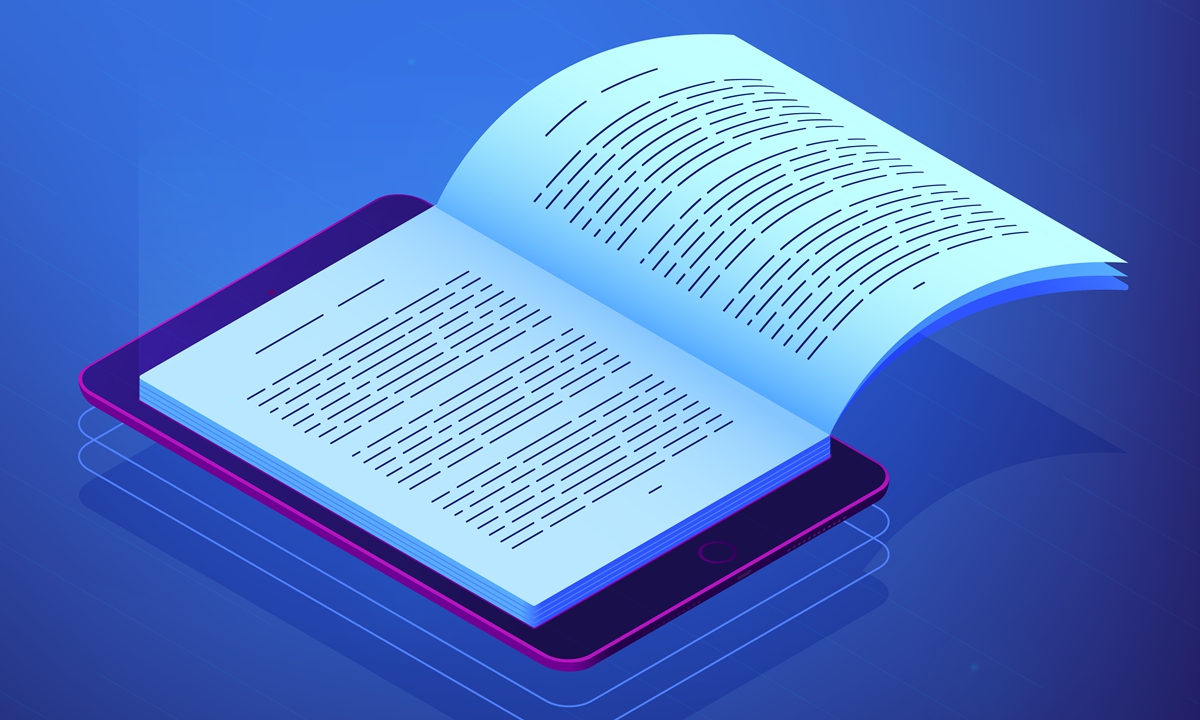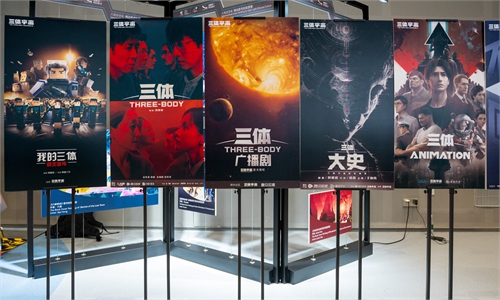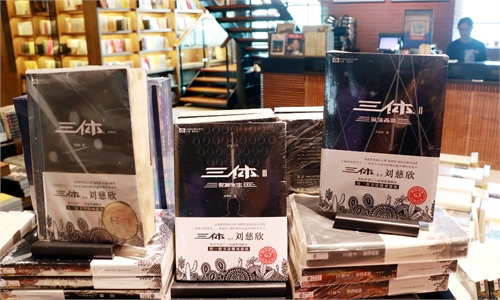ARTS / CULTURE & LEISURE
‘The Time Machine’ a sociological sci-fi story
Keen mind
Editor's Note:
"Read ten thousand books, and your pen will be guided as if by the gods" is an ancient Chinese idiom that can be seen in students' textbooks. China's Ministry of Education has published an action plan to further promote reading among students across the nation. With new and diverse book recommendations, the reading scene is expected to be revived not only at schools, but also across society. To contribute to this endeavor, the Global Times launched "My Reading Life" essay contest for middle school students.
Please pick up a pen and share your stories with us at reading@globaltimes.com.cn
Participants will be rewarded once the article has been selected.

The Time Machine is a groundbreaking science fiction first published in 1895. It tells the story of an unnamed protagonist, referred to as "The Time Traveler," who invents a machine capable of traveling through time.
The narrative explores social issues and the consequences of technological advancements. Using his invention, the Time Traveler journeys to the distant future, where he encounters two species: the Eloi and the Morlocks.
These characters symbolize two different groups in the English society. Although the book's genre is science fiction, its reflection upon then English society's class issue is not confined by the novel's fictional style. Besides the writer Wells, I also noticed that many English writers have also discerned how overtly distinguished social hierarchies have changed people's fate, lifestyles and paths for self-identification in traditional English society.
Such keen social concerns from these writers have inspired me to see that the root of creative writing likely lies in reality. A good writer may not always be someone who uses complex words or beautiful language, but rather someone who rationalizes emotions and realistic events, and presents them in plain writing.
Besides my reflections on the author's writings, I also want to mention that The Time Machine's narrative is a compelling exploration of species evolution, and the ramifications of technological progress. It challenges us to reflect on our responsibilities and the legacy we leave for future generations.
What resonates with me most is the book's ability to incite introspection on the human condition, questioning the moral implications of our advancements and our duties to the environment and one another. The Time Machine is a cautionary tale that remains relevant, reminding us of our power to shape the future.
This book has instilled in me the importance of considering the long-term consequences of our actions and working toward a more just and sustainable world. It serves as a mirror to humanity, reflecting our potential and our pitfalls. It is a book I highly recommend for those who seek a stimulating and imaginative time-travel experience.
As one of the earliest works of science fiction, The Time Machine introduced the concept of time travel using a machine and has since influenced countless stories in the genre. The novel is a compelling blend of philosophical speculation, cementing H.G. Wells' legacy as one of the pioneers of modern science fiction.
Wells is also one of my favorite writers. Known for his vivid imagination and forward-thinking ideas, Wells wrote numerous novels, essays, and works of nonfiction that explored the intersection of science, society, and human nature.
Beyond science fiction, Wells was a prolific writer of realistic fiction and social criticism. His works, such as Kipps and The History of Mr. Polly, delve into the lives of ordinary people and explore issues of society. Wells also wrote nonfiction works, including The Outline of History, which aimed to provide an account of world history.
In 2001, a miniseries featuring the legendary writer as the main role was launched. It was called The Infinite Worlds of H.G Wells. It depicts a story in London back in 1946, during which a journalist interviews H.G. Wells about his connection to a mysterious scientist. Unbeknownst to him, she is an undercover agent with a hidden tie to the enigmas they are unraveling.
The author is a student at Beijing Haidian Foreign Language Experimental School
"Read ten thousand books, and your pen will be guided as if by the gods" is an ancient Chinese idiom that can be seen in students' textbooks. China's Ministry of Education has published an action plan to further promote reading among students across the nation. With new and diverse book recommendations, the reading scene is expected to be revived not only at schools, but also across society. To contribute to this endeavor, the Global Times launched "My Reading Life" essay contest for middle school students.
Please pick up a pen and share your stories with us at reading@globaltimes.com.cn
Participants will be rewarded once the article has been selected.

Photo: IC
H.G. Wells, a beacon in the realm of science fiction, has particularly captivated me with his novel titled The Time Machine.The Time Machine is a groundbreaking science fiction first published in 1895. It tells the story of an unnamed protagonist, referred to as "The Time Traveler," who invents a machine capable of traveling through time.
The narrative explores social issues and the consequences of technological advancements. Using his invention, the Time Traveler journeys to the distant future, where he encounters two species: the Eloi and the Morlocks.
These characters symbolize two different groups in the English society. Although the book's genre is science fiction, its reflection upon then English society's class issue is not confined by the novel's fictional style. Besides the writer Wells, I also noticed that many English writers have also discerned how overtly distinguished social hierarchies have changed people's fate, lifestyles and paths for self-identification in traditional English society.
Such keen social concerns from these writers have inspired me to see that the root of creative writing likely lies in reality. A good writer may not always be someone who uses complex words or beautiful language, but rather someone who rationalizes emotions and realistic events, and presents them in plain writing.
Besides my reflections on the author's writings, I also want to mention that The Time Machine's narrative is a compelling exploration of species evolution, and the ramifications of technological progress. It challenges us to reflect on our responsibilities and the legacy we leave for future generations.
What resonates with me most is the book's ability to incite introspection on the human condition, questioning the moral implications of our advancements and our duties to the environment and one another. The Time Machine is a cautionary tale that remains relevant, reminding us of our power to shape the future.
This book has instilled in me the importance of considering the long-term consequences of our actions and working toward a more just and sustainable world. It serves as a mirror to humanity, reflecting our potential and our pitfalls. It is a book I highly recommend for those who seek a stimulating and imaginative time-travel experience.
As one of the earliest works of science fiction, The Time Machine introduced the concept of time travel using a machine and has since influenced countless stories in the genre. The novel is a compelling blend of philosophical speculation, cementing H.G. Wells' legacy as one of the pioneers of modern science fiction.
Wells is also one of my favorite writers. Known for his vivid imagination and forward-thinking ideas, Wells wrote numerous novels, essays, and works of nonfiction that explored the intersection of science, society, and human nature.
Beyond science fiction, Wells was a prolific writer of realistic fiction and social criticism. His works, such as Kipps and The History of Mr. Polly, delve into the lives of ordinary people and explore issues of society. Wells also wrote nonfiction works, including The Outline of History, which aimed to provide an account of world history.
In 2001, a miniseries featuring the legendary writer as the main role was launched. It was called The Infinite Worlds of H.G Wells. It depicts a story in London back in 1946, during which a journalist interviews H.G. Wells about his connection to a mysterious scientist. Unbeknownst to him, she is an undercover agent with a hidden tie to the enigmas they are unraveling.
The author is a student at Beijing Haidian Foreign Language Experimental School



